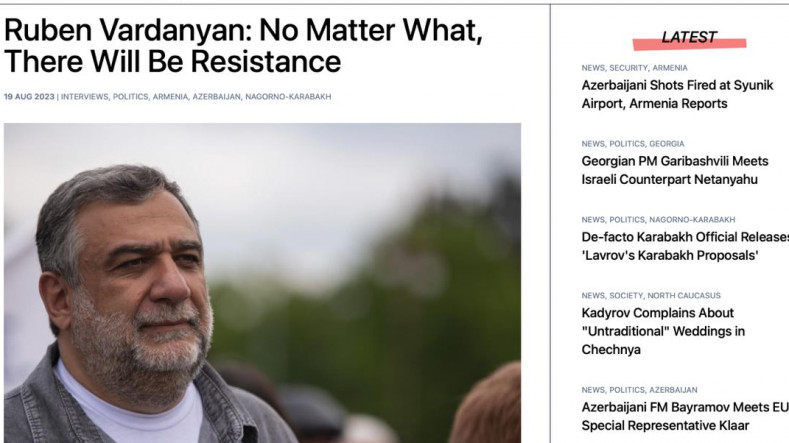
Ruben Vardanyan: No matter what, there will be resistance in Artsakh
The people of Artsakh (Nagorno-Karabakh) will show resistance no matter what, Ruben Vardanyan, a former Artsakh state minister and coordinator of the Artsakh Security and Development Front public movement, said in an interview to Caucasus Watch on 19 August.
Asked whether Artsakh is preparing for resistance, even in a "violent scenario”, he noted. “Absolutely. Yes. There will be resistance, no matter what happens.”
"And there is a point worth making here. When your message of resistance is clear and the nation stands behind it, there is opportunity to draw unexpected support. As soon as we are clear on our intention to fight for our rights, I feel, we will be able to seize opportunities for support. We should not look only to the West or to Russia. We should work with all sides, including the East, and make these cooperative relations and alliances serve our interests as much as possible.," Vardanyan said.
"Once we are unequivocal about our intention to fight for our rights, I believe we will be capable of seizing opportunities for support. When your message of resistance is lucid and embraced by the nation, opportunities to secure unexpected support can arise. By being resolute about our intention to fight for our rights, I believe we can harness these opportunities for support. In certain circumstances, rivals might even cooperate, and we can endeavour to become such a place.
"Use of brute force (and that is what Azerbaijan is doing) is very 19th – 20th century way of resolving the disputes. Perhaps I am wrong, and it’s a wishful thinking on my behalf, but the popular consensus in the West is solidifying (even more so in the light of war in Ukraine) and military force is archaic mean of conflict resolution. It’s not just legally, morally unacceptable, it’s also aesthetically obsolete. Just watch “All quiet on the western front” – is there a room for the trench war fare in the 21st century?
"So, there are three elements that need to come together. First, our desire to resist and fight for our rights needs to be more clearly articulated, both to consolidate our home front and to position ourselves more clearly in the world.
"Secondly, we need to be preparing for the transformation of the current global status quo and ready to address new threats and seize new opportunities.
"Thirdly, we need to start talking even if not negotiating with Azerbaijan. We need to communicate to Azerbaijan that they are overplaying their strong hand. {President} Aliyev is trying to maximise his short-term benefits, not thinking long term. Who knows what comes 20 years down the line? A country singularly dependent on oil and gas revenue may soon find itself dealing with a multifaceted crisis. Without dwelling too much on this topic, I think he is not using wisely his current power," he remarked.
Asked whether he sees Karabakh has a place on the negotiating table in any of the existing formats given the phrasing of the November 9, 2020 trilateral statement, Vardanyan said: "There are two different elements in your question. First, the question is whether Artsakh can become a party to the negotiations. We need to be back to the negotiation table as it was after the ceasefire of 1994. When we were left out in 1998. But all the developments show that our fate cannot be decided without us."
"The second element is geographic and has no substance. The agenda is of substance and Artsakh has no input. Azerbaijan in substance does not want to negotiate over the future of Artsakh. They want to consolidate the status quo and turn a page. They say ‘this is our domestic agenda,’ take it or leave it. So, it is irrelevant which ‘big player’ tables the discussion with Azerbaijan because for Baku there is no Artsakh issue.
"In this context, Armenia does not stand in for Artsakh. When Yerevan says Artsakh is part of Azerbaijan, this makes my statement a non-controversial position. Armenia’s position today is that ‘we do not represent Artsakh,’ and that is a weak position. This creates a vacuum begging the question ‘who represents Artsakh”. The answer is that Artsakh should be able to present itself. This is the only way," he added.
Newsfeed
Videos






























